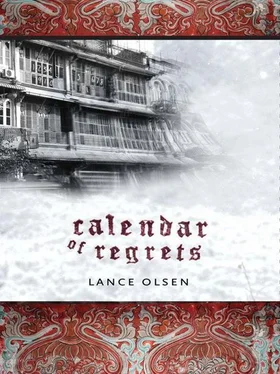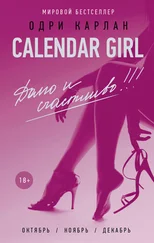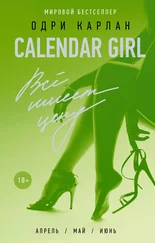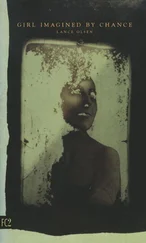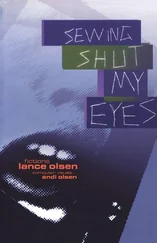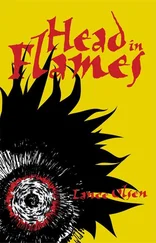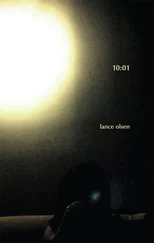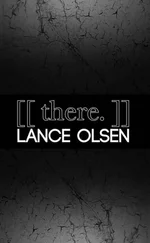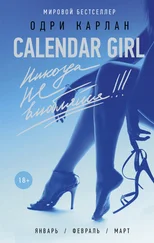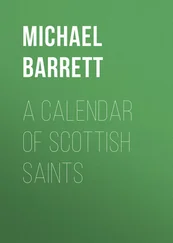Because—
Because in another version, one that seems equally et cetera, I want to say I haven't been asleep at all, no, and so perhaps this is simply what is going through my mind, what was going through my mind, as Moira reached for the door handle of her desert-sand Corolla and someone reached in and extracted all the bones, large and little, from her legs — femur, tibia, fibula — and, just for a moment, just before her lower torso folded up under me like an empty skirt, I want to say she commenced recollecting someone else's story, sure, why not, it happens every day, everywhere, the world after all isn't as rich in narratives as it looks, no, it's more so, it's a book of books, my sister's, conceivably, conceivably Sarasa's story, I don't know why I think that, I don't know where she is, I don't even really know who she is, which is to say we've never been especially close, we don't keep in touch much except on birthdays, on birthdays and sometimes Christmas, and even then it feels like I've just picked up the phone and dialed a stranger's number and decided to take a stab at conversation, she always leaves messages when she knows I'm not in, but she's not here, that's certain, not in this room, I want to say, not in this city, probably not even in this country, no, it couldn't have been my own story, in any event, no, that's definite if nothing else, whosever it is, wherever it originates, because it was a bittersweet love story, you see, and I have none of those, bittersweet or otherwise, I wish I did but there you are, look at me, look at me, you want this but you get that, repeatedly, and the story in question, this new story, I want to say, launched with the words shortly after they were married , a lovely opening, full of potential, someone else's voice whispering somewhere far behind my eyes, never, ever, in Moira's estimation, a propitious sign, shortly after they were married , it began,
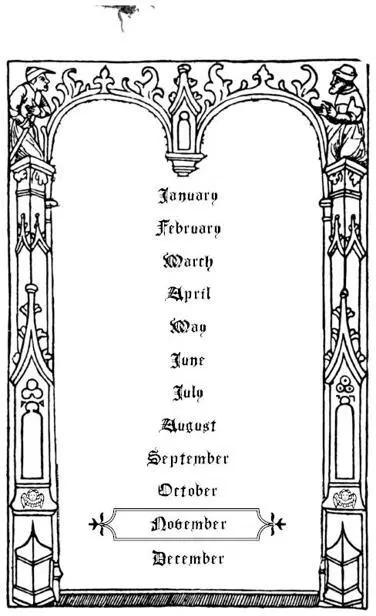
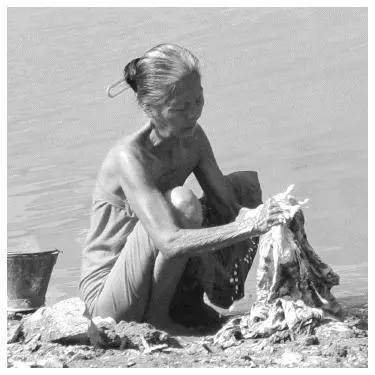
12.08.76. Shortly after they were married, Victoria and Albert visited Florence and were taken by the city's incredible architecture, especially Brunelleschi's dome atop the Basilica di Santa Maria del Fiore with its distinctiveoctagonal design built out of something like four million bricks. When Victoria returned several years after Albert's death, the queen was delighted to see the dome restored. She ordered her carriage to stop in the piazza, rolled down her window, opened the locket around her neck, and turned the tiny picture of her husband toward the cathedral so he could enjoy the sight, too. After a moment's silence, she flipped the locket shut, rolled up the window, and ordered her carriage to drive on.
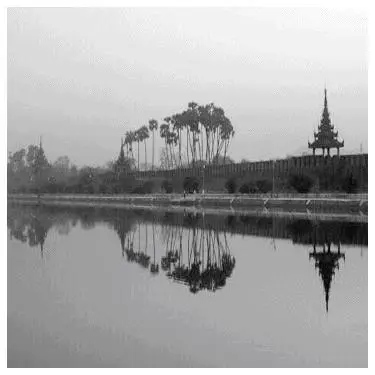
12.09.76. Did you know, Taru, that Mandalay didn't start as a small settlement like most cities? Instead, the story goes, Buddha, passing through the area, pointed to the hill where much of Mandalay now exists and foretold on that site a great capital of his religion would blossom. On January 13, 1857, King Mindon issued a decree to fulfill that prophecy. The former royal city of Amarapura was dismantled piece by piecestone by stone and moved by elephant to the foot of the hill. The king was also responsible for ordering made the Ti-pedikut , the world's largest book: 729 pages of Buddhist scriptures inscribed on 729 marble slabs, each housed in its own stupa. A book whose pages you stroll among like you would huge gleaming white shrubbery in a garden.
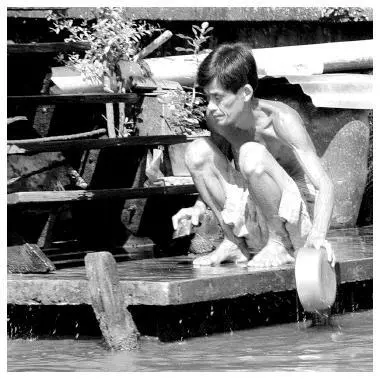
12.10.76. In 1892, the year he married and moved to Vermont (Vermont, of all places!), Rudyard Kipling composed his famous poem “The Road to Mandalay”—although the only city he ever actually visited in Burma was Moulmein, on the southeastern coast of the country, hundreds of miles away from, and nothing like, the place he wrote about.
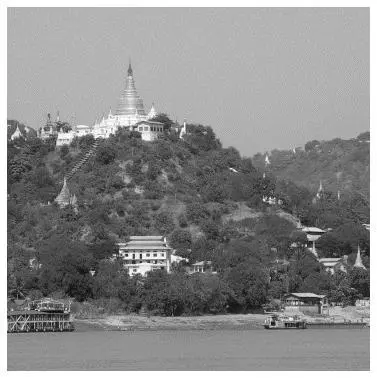
12.11.76. I'm sitting on a wooden stool on the thatched porch of a food hut on the river across from Mandalay hill, eating a bowl of chicken curry for lunch. The chunks of meat are dark brown, stringy, stiff, dry. I had to use my shirt to wipe off from my communal chopsticks whatever the last guy was eating before I could use them. This afternoon I'll visit Sutaungpyai pagoda at the top of the hill. Hens are zigzagging across the road in front of me like agitated women with feather petticoats lifted among people clattering by on bikes. A shorthaired beige dog squats, scratching his ribcage absentmindedly with a hind leg, staring straight ahead, as if the locals were moving in a less interesting dimension than the one he inhabits. On the bamboo wall beside me, three greengray lizards, eyes shut, frozen in a breathing knot. If I reached out, I could touch them.
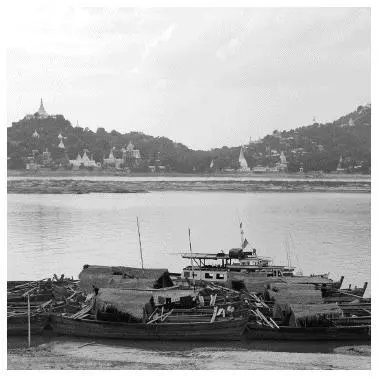
12.11.76. P.S. Tourism makes foreign countries into museums you walk through.
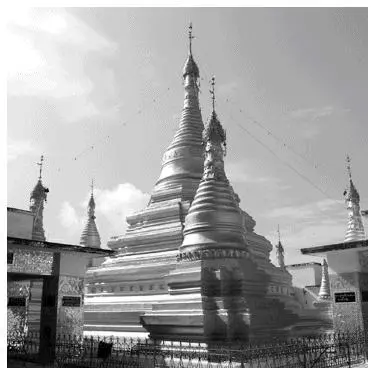
12.11.76. P.P.S. I guess what I'm trying to say, Taru, is that travel shows you what you already know in ways you don't recognize. How little you understand when you begin your journey. How much less when you end it. Which is exactly why you go.
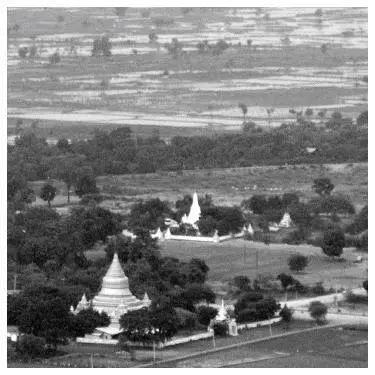
12.11.76. From the terrace of Sutaungpyai, flooded fields gleaming through hazy atmosphere all the way to the horizon. Shared the ferry over with five Brits — sweet, daffy hippy types with filthy cracked bare feet, paisley bandanas, colorful baggy Nepalese pants, baggy once-white shirts. They started improvising their way south and east two months ago, traveling from Katmandu to Janakpur, across into India, Bhutan, and now through Burma. They've enjoyed everything, they say, but it's Bhutan they adored most of all. Stepping into it was stepping into the thirteenth century. No phones, no paved roads, not one traffic light in the whole place. Bhutan moved from a system of barter to currency within the last ten years. Thimphu, the capital, has a population of slightly less than 30,000. But the hippies' favorite spot was the Tiger's Nest monastery perched on the side of a craggy cliff among colorful prayer flags at 10,500 feet. Approaching, all you hear is steady wind, chanting monks. Awesome, the hippies say. The coolest, man. You've got to see it. Difficult not to enjoy their goofy enthusiasm.
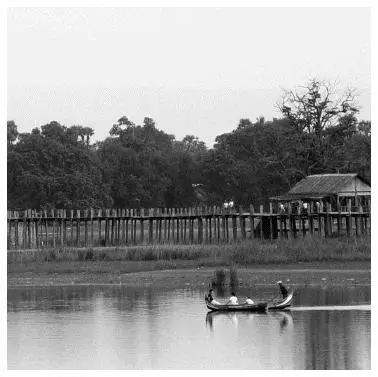
Читать дальше
